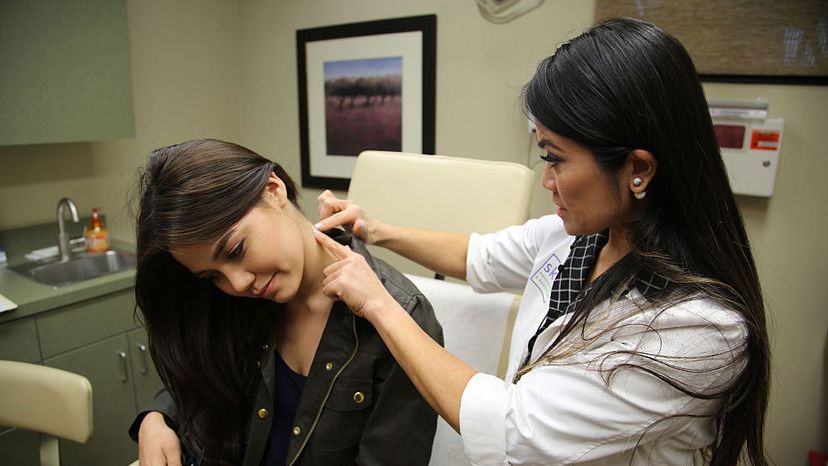\”

Most people don\’t like having pimples. In fact, acne treatment is a $5 billion a year global industry. But for many, there\’s a silver lining to the errant unwanted zit. Eventually, if you\’re patient, strategic and delicate, you\’ll get to pop it just right.
Don\’t worry – no one\’s judging (and if they are they\’re probably kidding themselves). Most people will talk about a love of zit-popping openly. There\’s even a major online presence of pimple-popping videos, like those put up by dermatologist Dr. Sandra Lee, better known as Dr. Pimple Popper, whose YouTube channel has more than 5 million followers. Whether or not watching other people\’s bodily fluids get expressed is your jam, popping your own is usually a pleasant, cathartic experience.
So, um, why? As with just about everything we do, the brain and a whole smorgasbord of chemicals are involved, so the human response to zit-popping is more complicated than most of us could ever imagine.
The Ick Factor
Zit management and monitoring often captures our attention, not because we think it looks nice or interesting, but because we\’re disgusted by it. The emotion of disgust is a powerful, multifaceted, often contradictory instinct. "You make that yuck face, you tend to think of the disgusting thing as contaminated and contaminating, polluted, you get that flash of nausea and emotional frisson — but you also tend to keep an eye on, keep track of, whatever it is that triggered your disgust," says Purdue University professor Daniel Kelly, the author of "Yuck: The Nature and Moral Significance of Disgust" in an email interview. "So, disgusting things also attract and capture attention — it\’s just part of the way the psychological system works, how it\’s able to do its job well."
As a result, this inherent disgust causes us to pop the zit or watch the zit-popping video. "For many people, pimple popping comes from a compulsion to ensure that their skin looks and feels smooth. They view any irregular patch or bump, such as a pimple, as an imperfection that must be removed," says Matt Traube, a psychotherapist in California who specializes in the psychological aspects of skin conditions in an email interview.
The Pleasure Principle
But there\’s also a pleasurable side to getting the pus out of a big zit on your face. Florida-based neuropsychologist Rhonda Freeman says that positive sensations associated with pimple-popping actually begin well before the act is committed. "Prior to popping the pimple there might be the sensation of wanting to engage in the act. The neurotransmitter dopamine is at play at this stage and may fuel some of the anticipatory excitement of going for the zit," she emails. "This can cause a person to feel stimulated, as this system is ignited into action. Stimulating because it could be gross, there is the possibility of pain, and it might get messy."
The fun is hardly over before it begins, however. "Once the pimple is popped, there is often the immediate sensation of pleasure and relief. This is probably thanks to the \’liking\’ or hedonic response from the reward system," she adds, noting that the neurotransmitters in action at this point are endogenous opioids, which double as natural painkillers and generally just make us feel good.
Then there are those people who enjoy popping other people\’s pimples. If you think they\’re nuts, they\’re not. In fact, this urge is as old as time, and is commonly seen in primates.
"Primates are very social creatures and experience the release of oxytocin when engaged in the act of grooming. We have the same neurochemical release when we groom each other," Dr. Freeman says, noting that oxytocin release is a common, expected by-product of grooming others. "On our own, the pimple popping is stimulating, it satisfies want (dopamine) and results in the sensation of pleasure when the act is done (endogenous opioids). However, when it involves someone else, the chemistry of bonding comes into play (oxytocin)," she says.
There is dark side to dealing with zits, however. "The act of pimple popping can also fill emotional needs," Traube says. "If you are stressed or anxious, pimple popping can give temporary relief, but doesn\’t address the underlying issues. Instead of dealing with the actual problems, pimple popping can be a quick fix that makes you feel like you are resolving an urgent matter or source of stress."
Psychotherapist Traube also notes that excessive pimple popping is a way that some people abuse themselves, especially those who are being picked on by others, whether at home, work, school and so on.
"Popping your pimples can be a strategic behavior to give you a sense of control over yourself. By literally picking on yourself you can feel some control over the unwelcome behavior of others," he explains, adding, "Your skin can be become a metaphor, with pimples acting as a message of inferiority. Clearing those pimples can provide relief."
Now That\’s Cool
The pleasure some get from popping zits may also extend to popping bubble wrap. The act of popping those plastic pieces releases muscle tension, effectively reducing stress. It has also been shown to facilitate calmness and attentiveness.















